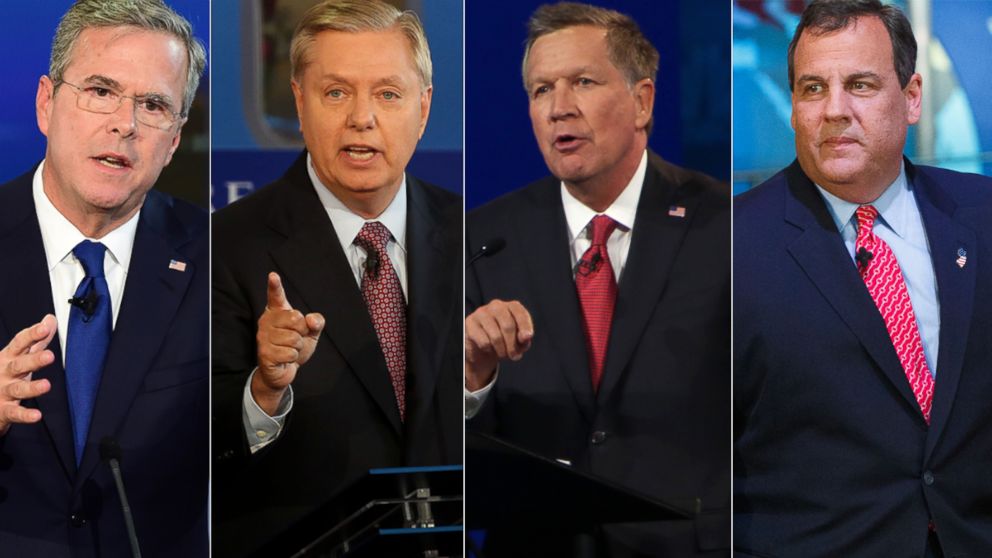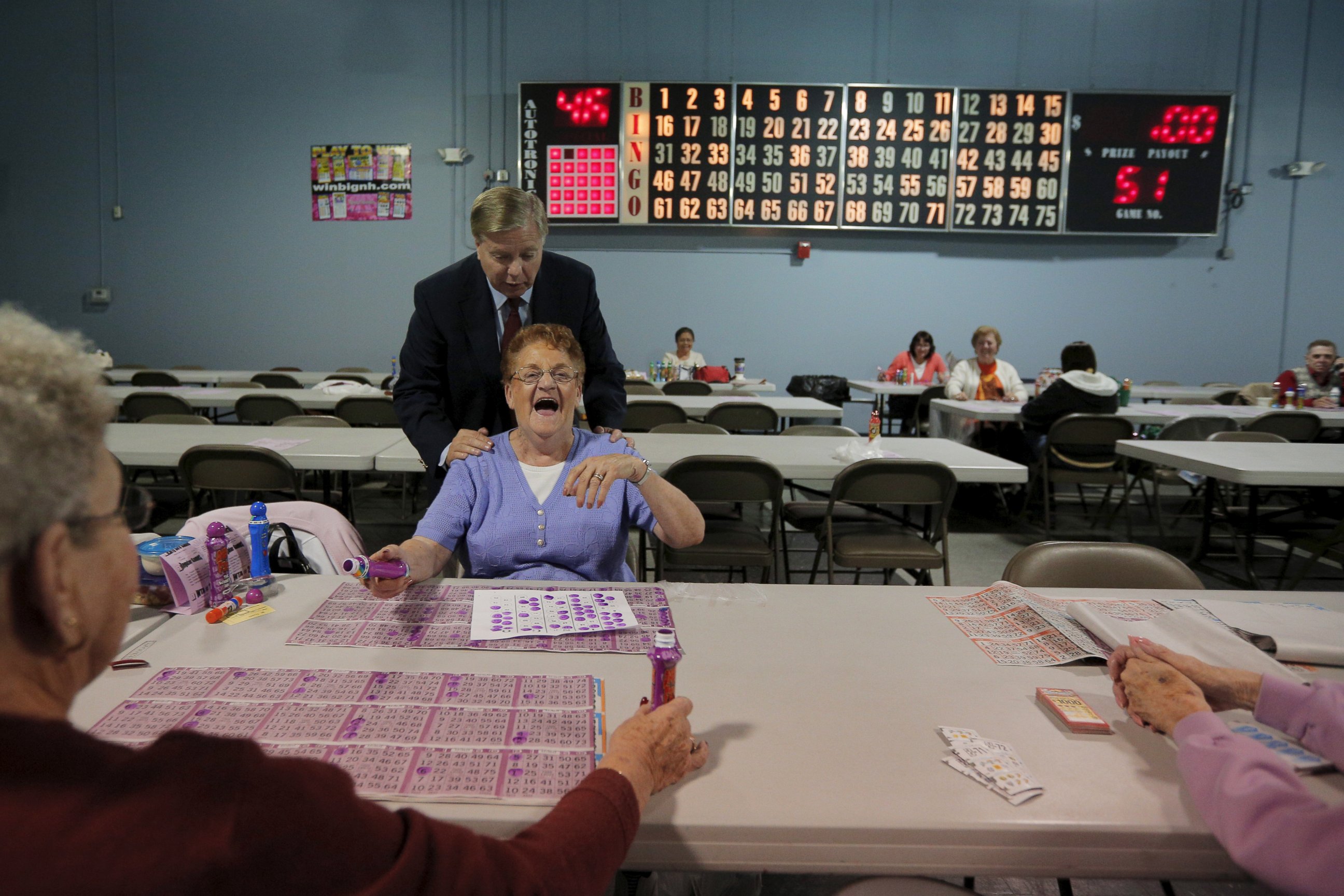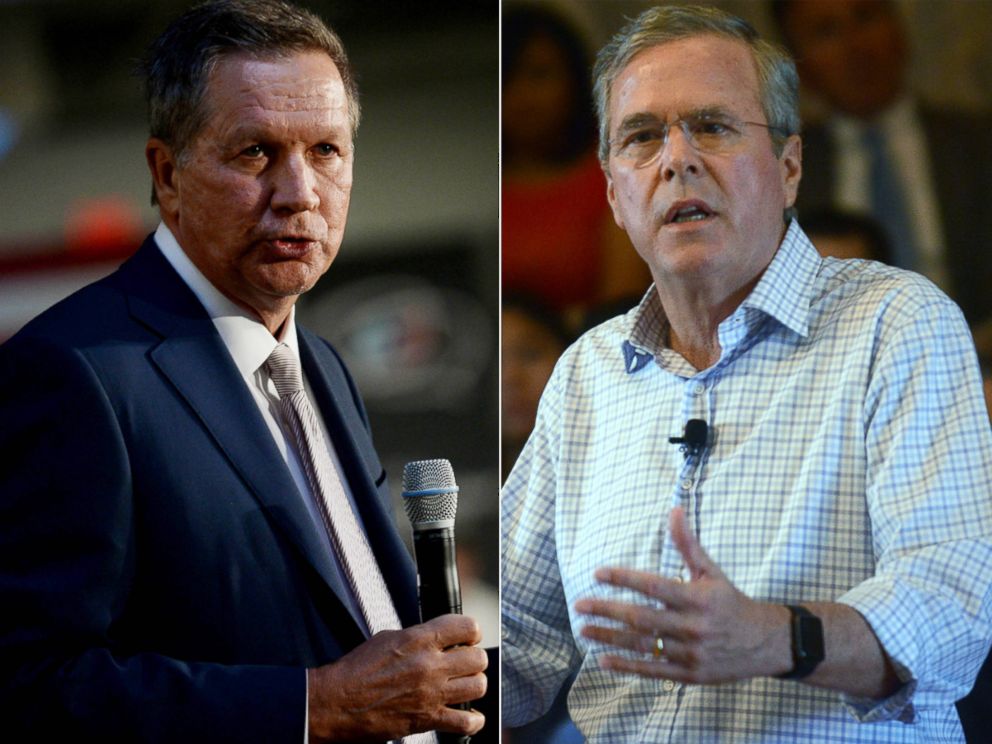These Candidates Bet It All on New Hampshire at Their Own Risk
“It’s not a high probability in the best of times,” one analyst says.

MANCHESTER, N.H. -- When Fox Business News and the Wall Street Journal announced their debate lineups for tonight, there were some notable downgrades: Chris Christie and Mike Huckabee were relegated from the prime time slot to the undercard debate at 7 p.m. E.T., while Lindsey Graham and George Pataki, failing to average at least 1 percent in several recent national polls, were cut from the stage altogether.
With the exception of Huckabee, the demoted candidates all share one strategy in common: an “all-in” strategy on the state of New Hampshire.
“All candidates would like to run everywhere if they can,” said Dante Scala, a political science professor at the University of New Hampshire. “But when they are relatively week, they focus on the early state that seems to suit them best.”
In the past, New Hampshire was a safe bet. With its first-in-the-nation primary and manageable size, the tiny state was a place where campaigns could easily reach voting blocs that could propel a candidate to victory.
“It worked for Gary Hart in ‘84, it worked for Carter in ’76,” said James Russell Muirhead Jr., a professor of government at Dartmouth College, adding that virtual unknowns have managed to pull out improbable victories in the Granite State before.
But he also pointed out that while bus tours, handshakes and diner visits are still considered good retail politics, they don’t secure a place on a debate stage anymore.
“It’s not a high probability in the best of times,” he said of the New Hampshire-only strategy. “If you add the idea of this debate format, it makes going door-to-door that much more desperate…and that much more unlikely to work.”
Indeed, with all-important debates relying on national polling, a state-by-state strategy could blow up in your face. So who’s betting it all on New Hampshire – and how are they faring?
Lindsey Graham

No one has spent more time in the state than the South Carolina senator, who has campaigned in bingo halls, barber shops, even the Bedford city dump. As one of the only two veterans in the race (Jim Gilmore, who has spent even less time on stage than Graham, is the other), his regular visits with buddy John McCain to VFW halls were supposed to make an impression in a state where 10 percent of voters have served in the military.
But the visits have failed to raise his poll numbers above 1 percent in the state. Nationally, he’s barely registering, leading to his dismissal from either of tonight’s debates. But he says he’ll continue to plug away in New Hampshire, declaring that he needs to perform in New England if he’s going to have any shot in his home state.
“If I do well in New Hampshire, I’ll win South Carolina,” Graham said in October. “If I don’t do well in New Hampshire, I’ll have to re-evaluate.”
Graham has spent more than 50 days in the state just this year, and because he has no debate to attend tonight, he’ll add one more to his tally as he watches the debate on TV.
If anyone has a reason to bet the farm on New Hampshire, it’s the governor from New Jersey, whose close proximity and “tell it like it is” attitude seem a perfect match for the Granite State. Saturday marked his 46th day in the state since he announced his candidacy, and his is schedule looks an awful lot like John McCain’s successful run in 2000; an absolutely ruthless schedule of town halls, where he stays until nearly every question has been exhausted.
But perhaps no one’s New Hampshire strategy has been more damaged by this year’s debate formats. His statewide support is several points higher than in national surveys – but because networks are solely relying on national polls to set the stage, Christie now finds himself stuck in the bottom tier. Nevertheless, he says he’s not changing anything about his strategy.
“I don’t think I need to do anything else,” he said after filing his official candidacy paperwork Friday. “I just need to do more of it.”
With his wife, Mary Pat Christie, at his side, he told reporters that November polls are a poor predictor of February primaries.
“Feel the weather out there,” he said, on a balmy 70-degree day. “Doesn’t feel like voting weather to me.”
Dartmouth’s Muirhead, conceded that Christie and Graham could be right: With enough grassroots effort, it’s possible to get New Hampshire voters on your side, without the help of television.
“[Their] retail strategy is based on building familiarity and trust with voters one by one,” he said. “If they’re right, it doesn’t matter if they’re on the debate stage. Being on the street, knocking on doors, would [theoretically] displace the effect of the debate.”
If he were running, though, “I myself wouldn’t buy into that strategy,” Muirhead said.
George Pataki

Despite being a former governor of New York, George Pataki suffers from an acute lack of name recognition nationwide. Unfortunately for him, the case isn’t much different in New Hampshire, where he spends most of his time – more than 30 days this year, according to recent tallies. Pataki’s moderate stances (he’s pro-abortion rights, for starters) seem to agree with the majority of Granite Staters – but he’s been stuck at less than 1 percent in statewide polls.
Now, he finds himself without a stage to stand on. Hours after being dismissed from the Fox Business News debate, he issued a statement, saying “running for the most important leadership position in the world shouldn’t be reduced to the level of ‘American Idol’ or ‘Survivor.’ The voters – not networks driven by ratings or national polls that are statistically irrelevant – should decide our next president.”
Honorable mentions: John Kasich and Jeb Bush
Neither Kasich nor Bush has quite as singular a focus on the Granite State as Graham, Christie or Pataki. But each sees New Hampshire as a launching pad for bigger and better things.
“The thought with Kasich is, ‘If he could do well in the New Hampshire primary, he would be unbeatable in the general election,’” professor Muirhead said.
But among the current crop of candidates, combined with the dissatisfaction of GOP voters, he admitted “I wouldn’t bet my salary on him getting the nomination.”
With weeks’ worth of visits under his belt, and dozens of stops on his New Hampshire bus tour, Kasich has spent a significant amount of time in the state. Many agree it holds his best chances as an early voting state, with Iowa and South Carolina tilting toward more hardline conservative candidates.
For Jeb Bush, meanwhile, New Hampshire “is a backstop,” according to Muirhead. “That’s what it was for Gary Hart – the guy just kept showing up in New Hampshire.”
Hart, who started at 1 percent in national polls, went on a then-unprecedented tour of New Hampshire, rising to the middle of the pack and eventually winning the state by 10.
Faced with sagging poll numbers, dwindling donors, and uneasiness from supporters, the Bush campaign has refocused its efforts on the Granite State as a place to retool. It’s a place where his Jeb’s father, President George H.W. Bush, remains popular, and where a network of supporters remains intact. He’s even invested in a bus of his own.
But New Hampshire alone may no longer be enough to resurrect a campaign. After what some supporters deemed a “horrible” debate performance in October, Jeb Bush will try to use the national spotlight to fuel a rise stretching from New England to Florida – and in turn, avoid resorting to the one-state focus like some of his competitors.
“Christie, Kasich and Jeb all fit in the New Hampshire-or-bust category,” UNH professor Scala said, “so it will be a good test of the influence of debates – to see whether Kasich and Bush take off, and [whether] Christie lags after this week's debate.”
“Christie's the test case,” he added. “Graham and Pataki are so weak, there's not much to decimate.”




